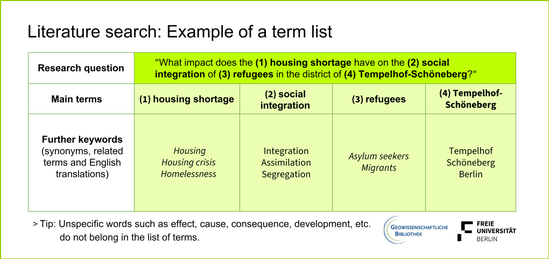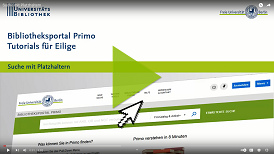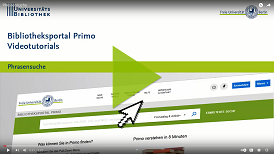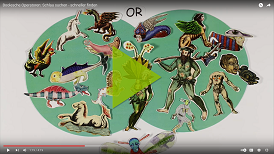Department of Earth Sciences
Service Navigation
Index
Citing at the Institute of Geographical Sciences
Your Library-Team
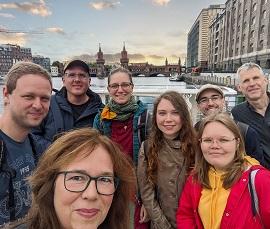
This is how we look like ;-)
Questions, concerns, suggestions? Feel free to contact us.
We can also arrange an appointment for more complex enquiries.
Address:
Malteserstr. 74-100, 12249 Berlin
Phone number: +49 30 838-70205
E-Mail: geolib@zedat.fu-berlin.de
Newsletters & Social Media
Newsletter of the Earth Sciences Library
UBtoDate - Newsletter of the University Library of the Freie Universität Berlin
Biblioblog - Blog of the Libraries of the Freie Universität Berlin
Thematic literature review
The thematic literature review is a complex, non-linear process - just like life.
To find the most relevant publications on a particular topic, we usually have to use different search queries and search tools (including bibliographic databases). And sometimes we come across an important source too late and purely by chance. This is normal.
The following tips and resources can help you to organise your literature search as efficiently as possible.
- Section 4 of the "Recommendations for the preparation of theses and presentations at the Institute of Geographical Sciences (in German)" contains useful information on literature searches.
- The FU University Library offers, among other things, training on thematic literature review as well as individual coaching on literature searches for term papers or theses.
- The Earth Sciences Library regularly organises coffee lectures on literature searches. You are also welcome to contact us if you would like individual help!
The Writing Workshop at Osnabrück University has produced a guide on finding a topic, which we would recommend: How do I find a topic? (in German)
Once you have decided on a topic, you can start formulating a research question. There is a good article on the Scribbr platform with numerous examples of good and bad research questions.
>> Tip: Take a look at theses from your subject. How did other students formulate their research question? What did they do well or not so well? The Earth Sciences Library has many printed theses in its collection. You can also use online university repositories such as Refubium (FU) and publish.UP (University of Potsdam) to find theses.
Search terms are required for a thematic search. You must define these based on your research question. It is worth devoting sufficient time to this stage, as you will only find enough relevant literature if you use a variety of suitable search terms.
In the following example research question, there are four main terms. English and German synonyms must also be found for these main terms in order to thoroughly search the available literature. A 'list of terms' (see below) is very helpful for this.
Example research question: "What effects does the (1) housing shortage have on the (2) social integration of (3) refugees in the district of (4) Tempelhof-Schöneberg?"
Formulating a search queryThe search query is about combining your keywords and search terms in such a way that you find as many relevant (and as few irrelevant) publications as possible. The University Library Münster created an overview in German, of different techniques for this:
>> Caution: These techniques can be used with many, but not all search engines. Check the website of the respective search engine to find out which search functions are offered there. Here are the most relevant literature databases and search engines for geography students.
A search query based on the above research question could look like this:
(apartment* OR housing* OR homeless*) AND (integr* OR assimil* OR segreg*) AND (refugee* OR refugee* OR asylum*) AND (Tempelhof OR Schöneberg OR Berlin)
But you should definitely try out different (even shorter and simpler) search queries. The quality of the search query plays a major role, of course, but the literature search still works according to the "trial and error" principle. This means that the more attempts you make - with different search queries and various literature databases - the higher your chances of finding the most relevant publications.
- If you find a relevant source, analyse it carefully! You will not only find useful keywords and search terms for your further search, but also a bibliography with other publications that are relevant to you.
- If you get too many search results, there is a risk that you will overlook the publications that are most relevant to you. You should then use more search terms or more precise terms to limit the number of results.
- If there are too few search results, you should (1) try other search terms or, if that doesn't work, (2) search for literature on a broader topic. You can either use fewer or more general search terms.
Example: If you cannot find any relevant publications with the search terms "housing shortage", "social integration", "refugees" and "Tempelhof-Schöneberg", even with synonymous keywords, you could exclude one of these terms from the search, or replace "refugees" with the more general term "migrants". You will probably get more results this way.
Video-Tutorials
Search with wildcards (in German) [3:02]
Phrase search (in German) [2:31]
Boolean operators (in German) [4:19]
Additional information
Handouts on academic writing (University of Osnabrück, in German)



